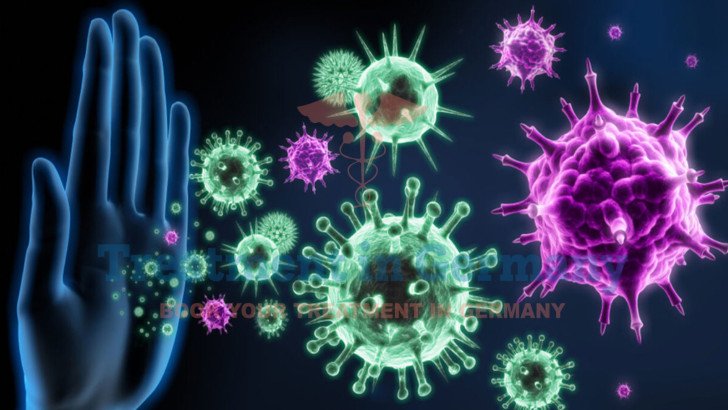
Dendritic cells, often dubbed the immune system’s generals, play a pivotal role in directing anti-cancer attacks, offering hope for patients battling various malignancies.
Dendritic cells, often dubbed the immune system’s generals, play a pivotal role in directing anti-cancer attacks, offering hope for patients battling various malignancies. Germany, a global leader in advanced cancer immunotherapy, harnesses the power of dendritic cell therapy to combat cancer
Dendritic cells are specialized immune cells that act as sentinels, detecting and presenting antigens from pathogens or cancer cells to T cells, the immune system’s soldiers. In cancer, they identify tumor-specific antigens, initiating targeted anti-cancer attacks. Unlike other immune cells, dendritic cells excel at bridging innate and adaptive immunity, making them critical for immunotherapy. Germany’s hospitals and cancer clinics leverage dendritic cell therapy to amplify these responses, transforming cancer treatment for cancer patients with advanced or resistant disease.
Dendritic cell therapy is a cutting-edge immunotherapy that enhances the immune system’s ability to fight cancer by using engineered dendritic cells. These cells are extracted from a patient’s blood, loaded with tumor antigens in a laboratory, and reintroduced to stimulate T cells against cancer. In Germany, dendritic cell vaccines are tailored to each patient’s tumor profile, ensuring precision and minimal side effects. German oncologists pioneer this therapy, integrating it with other treatments to optimize anti-cancer attacks.
How Dendritic Cells Direct Anti-Cancer Attacks
The Geman protocol for dendritic cell therapy employs a sophisticated process to orchestrate anti-cancer attacks:
German specialists ensure precision, using state-of-the-art technology to maximize dendritic cell therapy outcomes.
Germany’s Mastery of Dendritic Cell Therapy in Cancer Treatment
Germany’s leadership in advanced cancer immunotherapy positions it as a global hub for dendritic cell therapy. Renowned university hospitals and cancer clinics deliver innovative protocols, particularly for advanced cancers like melanoma, lung, or prostate cancer, offering hope to cancer patients with limited options.
Strategic Role in Anti-Cancer Attacks
Dendritic cell therapy is vital for advanced or metastatic cancers, where traditional treatments like chemotherapy falter. Dendritic cells target antigens unique to cancer cells, such as NY-ESO-1 or MAGE-A3, driving robust immune responses. German oncologists use dendritic cell therapy post-surgery to eliminate residual tumors or as a primary treatment for inoperable cases, enhancing outcomes for cancer patients.
Synergy with Other Therapies
The German protocol integrates dendritic cell therapy with:
This multidisciplinary approach, led by German surgeons and oncologists, ensures comprehensive cancer treatment.
Innovation through Clinical Trials
Germany’s prominence in clinical trials for cancer provides access to experimental dendritic cell therapiesThese trials explore combinations with CAR T-cell therapy or oncolytic viruses, showing promise in extending survival. German cancer clinics lead global research, offering cancer patients cutting-edge immunotherapy options.
Why Germany Excels in Dendritic Cell Therapy
Germany offers unparalleled advantages for cancer patients seeking dendritic cell therapy:
Risk Factors and Cancer Prevention
While dendritic cell therapy targets existing cancers, understanding risk factors aids prevention:
German specialists advocate smoking cessation, healthy diets, and regular screenings (e.g., MRI or CT scans) to reduce cancer risk.
Diagnostic Precision for Cancer in Germany
Accurate diagnosis is the foundation of effective cancer treatment. German hospitals employ:
German radiologists and pathologists ensure precise staging, optimizing anti-cancer attacks.
Post-Treatment Care and Quality of Life
After dendritic cell therapy, German cancer clinics provide comprehensive follow-up:
Germany’s patient-centered approach ensures cancer patients achieve sustained recovery.
Challenges and Future Horizons
Dendritic cell therapy faces challenges, including variable immune responses and complex vaccine production. German researchers are addressing these through:
Future innovations may include AI-driven antigen selection and broader application across cancer types, enhancing anti-cancer attacks.
Conclusion
Dendritic cells, the immune system’s generals, orchestrate powerful anti-cancer attacks, transforming cancer treatment through dendritic cell therapy. Germany’s leadership in advanced cancer immunotherapy, driven by innovative clinical trials and world-class hospitals, offers hope to cancer patients worldwide. The German protocol for dendritic cell therapy delivers personalized, targeted immunotherapy, integrating seamlessly with conventional treatments to improve survival and quality of life. With the expertise of German doctors and cutting-edge technology, Germany remains a beacon for those seeking effective cancer treatment, redefining the fight against cancer.
Frequently Asked Questions
What is dendritic cell therapy in Germany for cancer treatment?
It’s a personalized immunotherapy using dendritic cell vaccines to drive anti-cancer attacks, offered at top German cancer clinics.
How do dendritic cells orchestrate anti-cancer attacks?
Dendritic cells present tumor antigens to T cells, triggering targeted immune responses against cancer.
Which facilities offer dendritic cell therapy in Germany?
Specialized university hospitals and cancer clinics provide advanced cancer immunotherapy.
Are clinical trials for dendritic cell therapy available in Germany?
Yes, German cancer clinics offer trials combining dendritic cell therapy with novel immunotherapies.
Is follow-up care provided after dendritic cell therapy in Germany?
Yes, including MRI, rehabilitation, and emotional support.
How does Germany compare to the UK/US for cancer treatment?
Germany excels in innovative cancer therapies, rapid access, and holistic care.
Can dendritic cell therapy prevent cancer recurrence?
It targets residual cancer cells, reducing recurrence risk.
Does Germany support international cancer patients?
Hospitals in Germany offer language assistance, travel coordination, and psychological support.
What are the latest advancements in dendritic cell therapy in Germany?
Germany pioneers mRNA-based dendritic cell vaccines and combinations with checkpoint inhibitors.
How does dendritic cell therapy differ from chemotherapy?
Unlike chemotherapy, dendritic cell therapy offers targeted anti-cancer attacks with fewer side effects, enhancing quality of life.
For further details, visit our contact us page
Kindly complete the form below, and our dedicated team will reach out to you promptly. We look forward to connecting with you soon!
Trierer Straße, 56072 Koblenz, Germany
.webp)
.webp)
 (1).webp)
 (1).webp)

.webp)
.webp)
 (1).webp)
 (1).webp)
